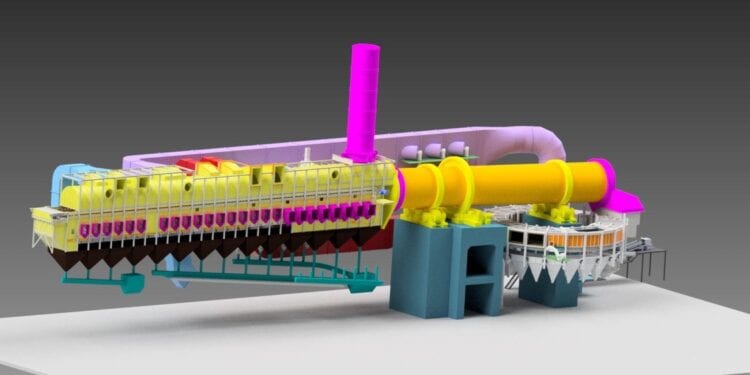Australian Vanadium Limited (ASX: AVL) has successfully completed bench-scale pelletising, roasting and leaching testwork and the commencement of a detailed pilot scale test programme with Metso in the USA.
Laboratory testwork completed in 2019 in Brisbane indicated that a pelletised roast and water leach of AVL’s vanadium rich concentrate can deliver improved vanadium extraction relative to traditional rotary kiln processing applied as the basis of the Pre-Feasibility Study (PFS).
Managing Director, Vincent Algar, said AVL is aiming to develop a processing flowsheet with the world’s highest primary vanadium recovery from vanadiferous titanomagnetite (VTM).
Between August and December 2019, a metallurgical test programme involving pelletising and oxidative salt roasting was carried out in Brisbane. The purpose of the programme was to investigate the performance of the oxidative salt roast in a pot rig, which simulates a commercial straight Grate Kiln.
Approximately 587kg of preliminary beneficiation concentrate was tested to characterise pellet performance, vanadium extraction, reagent usage and operating conditions for the Grate Kiln pilot testing scheduled at Metso in quarter 1 and 2 of 2020.
Results of the bench-scale testwork show:
- High quality pellets, with the mechanical strength required to survive the roasting process, can be produced without additional binders or processing steps.
- Vanadium roast leach extraction was as high as 95.5%, varying between 86.9% at low roast temperature and 95.5% under optimised temperatures, bed depths and retention times. All tests were performed at 4% soda ash addition, which was the basis for the PFS.
- The particle size required for pelletisation was confirmed to be similar to the particle size of the final concentrate generated in the crushing, milling and beneficiation (CMB) pilot.
“AVL is increasing its competitive advantage through process innovation. Our vanadium ore is very well suited to the traditional salt-roast methods, but we see opportunity in our testwork for processing improvements that could lead us to a world leading position when in production,” Mr Algar said.
“Improved vanadium recoveries, coupled with the potential to reduce gas consumption and related operating cost reductions, further reinforces the Project’s position as a desirable investment.
“Utilising the Grate Kiln technology, which is well-understood and with a proven track record in the iron ore, titanium and steel industries, is an innovation that our highly technical team has pursued as a result of the diligent testwork they are undertaking. Improving the economics of our Project is the Company’s key driver as we take each step forward.”
Mr Algar said technical data and learnings from this comprehensive bench-scale testwork will be applied in the next phase of piloting. Metso is currently developing flowsheet mass and heat energy simulations based on these results, in preparation for the pilot testwork beginning in February.
A two tonne sample of vanadium concentrate produced from CMB pilot scale testwork in Perth is in transit to Metso at its Pyro Technology laboratory located in Danville, Pennsylvania, USA.
The objective of the Metso pilot testwork programme is to optimise process economics and confirm design parameters for The Australian Vanadium Project’s Grate Kiln flowsheet. Completion of this phase of pyrometallurgical testwork is expected to deliver a high degree of certainty in forecasting full scale Grate Kiln performance and in the estimation of associated capital and operating costs for the Definitive Feasibility Study (DFS).
AVL’s bench-scale pelletising testwork demonstrated that vanadium roast leach extractions rose to an average of 92%, compared with a traditional rotary kiln extraction of 85-88%. Vanadium roast extraction in the AVL PFS was 87.9%.












